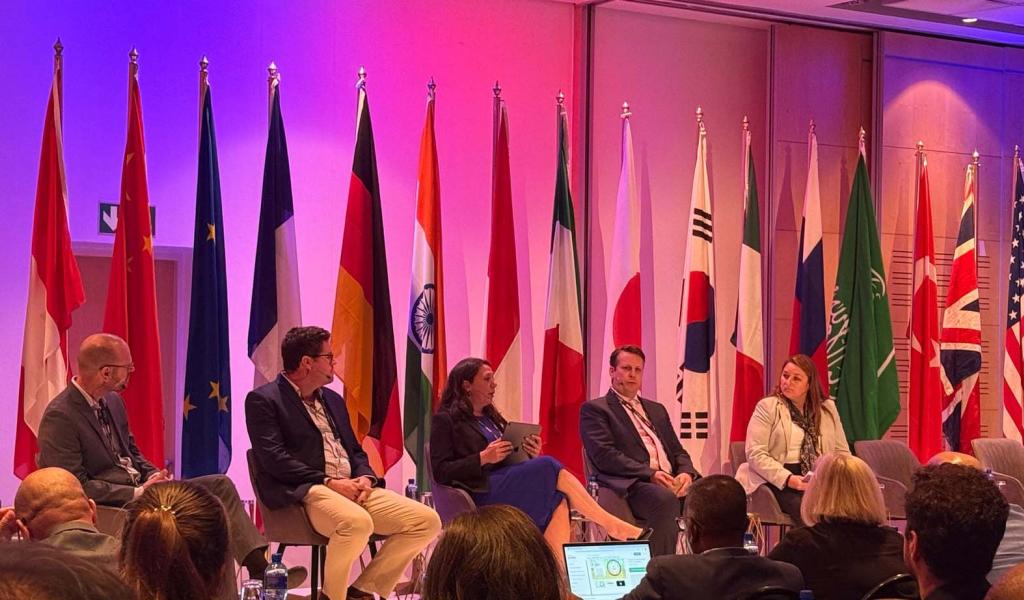News
EELA participates in the G20 ETWG 2 Side Event on Energy Efficiency and Affordability

Karin Reiss-Haimbala, Programme Manager for the Energy Efficiency for Sustainable Livelihoods in Africa (EELA) at UNIDO, participated in a high-level panel discussion titled "Mobilising Financing and International Cooperation as Key Factors for Doubling the Rate of Progress on Energy Efficiency." The session was part of the G20 Second Energy Transitions Working Group (ETWG 2) Side Event, held at the Cape Town International Convention Centre, South Africa.
Moderated by Rachel McCormick, Director General at Natural Resources Canada, the panel brought together distinguished energy leaders from around the world. Alongside Reiss-Haimbala, the panel featured Mariana Especie, Special Advisor at the Ministry of Mines and Energy in Brazil, Daniel Schroth, Director, Renewable Energy and Energy Efficiency at the African Development Bank, Mike Mulcahy, Chief Executive at Green Cape in South Africa, and Loui Algren, Chief Advisor at the Danish Energy Agency.
From innovative obligation schemes and incentive models to blended finance instruments and market transformation strategies, speakers explored practical tools to unlock investment and accelerate impact. Karin Reiss-Haimbala emphasized that scaling investment in energy efficiency depends fundamentally on building strong, credible markets. She highlighted how EELA is working to transform markets across Africa by supporting policy reforms such as Minimum Energy Performance Standards (MEPS), assisting industries via EELA’s Industry Clean-Tech Platform to access reliable and efficient technologies, tackling the coexistence of low- and high-efficiency products in unregulated markets, and deploying blended finance mechanisms to de-risk investments and encourage private sector engagement.
“When we talk about financing energy efficiency, we must also talk about markets. Investment will only scale if there is a viable, trustworthy market for energy-efficient products. The Energy Efficiency for Sustainable Livelihoods in Africa (EELA) Program aims to transform such markets at both regional and national levels. This means ensuring that consumers—from households to businesses—not only demand efficient products but can also access high-quality options they trust. To achieve this, our work focuses on strengthening policy frameworks, such as implementing minimum energy performance standards, and supporting industries through the Industry Clean-Tech Platform to identify, source, and deploy reliable, efficient technologies. One major challenge, especially across the African continent, is the lack of regulation—where efficient and inefficient products coexist, and the high upfront cost often steers consumers toward low-quality alternatives. Addressing this market imbalance is essential. That’s why we’re also focusing on the third key element: financing. Through innovative blended finance instruments, we aim to de-risk energy efficiency investments and accelerate the transition toward clean, affordable, and sustainable energy for all”, stated Reiss-Haimbala.
Energy efficiency is one of the most powerful tools for achieving international climate goals. According to the IEA, adopting the right energy efficiency policies can deliver over 40% of the emissions reductions needed, relying on cost-effective and existing technologies. To align with the Paris Agreement and the Sustainable Development Goals (SDGs), the global annual rate of energy efficiency improvement must double by 2030. In response to this urgency, countries participating in the Global Renewables and Energy Efficiency Pledge have committed to accelerating energy efficiency improvements, targeting a global average annual rate of over 4% by 2030. Achieving this ambitious target requires more than technical solutions: it demands global cooperation, aligned policies, and transformative market actions. The voices heard at "Mobilising Financing and International Cooperation as Key Factors for Doubling the Rate of Progress on Energy Efficiency" side panel underlined a unifying message: finance must meet ambition—and only through global cooperation, policy alignment, and market transformation can we double the rate of energy efficiency progress needed to meet climate and development goals.